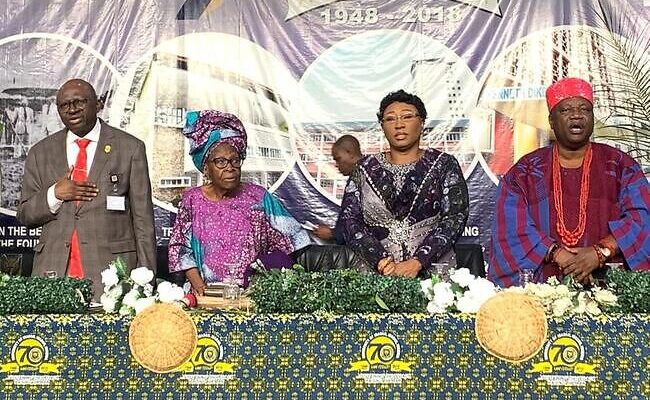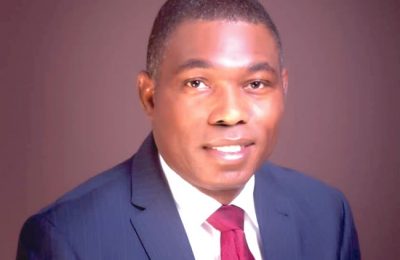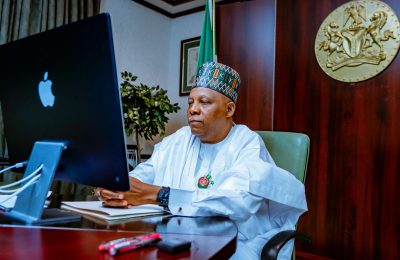By Kehinde Oyetimi
Historians and university administrators have celebrated the place of female academics in their contributions to the preservation and utilization of Africa’s oral traditions.
This took centre-stage at the opening ceremony of the Professor Bolanle Awe at 90 Conference held at the Trenchard Hall of the University of Ibadan. With the theme: ‘Oral Traditions, Written Histories,’ the two-day conference, aside celebrating the contributions of Professor Bolanle Awe who clocked 90, is expected to reassert the place and primacy of African oral traditions in global history.

Chief convener of the event, Professor Toyin Falola, representing the University of Texas at Austin, United States of America, told the media that “Emerging scholars must be on the legacy of the past. Emerging scholars must rethink the disciplines. Emerging scholars must mesh multiple ideas, grind them to create new intellectual products.
“Africans cannot shy away from their reality because they face pressure from those with whom they do not share the same historical and epistemic realities. If there is anything that the last 100 years have taught us as academics, it is that the world is not genuine in recognising alternative perspectives and that all campaigns for pluriversalism and multiplicities are a mere facade. Consider, for example, the story of the Remo people in today’s Ogun State, you would hear it in its sequential arrangement by the griot in Ekiti, and you would find no difference from what you hear by that Ekiti griot when an Oyo griot renders the same history. While the one and mechanisms of rendition may differ, what is constant is that the content would share compelling similarities among them. We should not, therefore, see this feat as ordinary and inconsequential. We need to efface the superficial gaze with which we have been programmed to see things. You would notice that the technology of preservation employed among the Yorùba has been systemically instituted across their social networks so that the vast majority of those archiving their history would have almost the same content without necessarily knowing one another before the performance of their activities. Do we now disarticulate this practice and say that the methodology it produces in getting information about our past is invalid? Again, should we not ask ourselves to what extent is written history from this oral one when deeply evaluated?
“From all that is known and available to us, we have heard many scholars refer to African elders as living libraries simply because they are the repository of history and esoteric knowledge. Like us, Africans who were usually not contaminated with Eurocentric modernity exposed themselves to different social activities in which they usually function actively and had the opportunity to register their influence. When they become elders, they are not condemned to the older people’s houses where they will while away their time till they transit to the great beyond. Instead, they enter into another age-group and age-grades where they reinvent themselves as members who would help shape the direction of their progress. This means that they would continue to offer substantial support and information that would help in the sustenance of their legacy and also the transformation of the world. They do this through their oral engagements to engineer society in ways they all conventionally anticipated. In essence, it would be culturally suicidal to euthanisethat particular system under the impression that we are being integrated into the Western epistemic identity in the contemporary time. That would do a grave danger to our collective civilisation. What would happen is that we would have an African space that limits the intellectualism of Euro-North American modernity.
“Those of us in the Western education pathway have embraced the Western written mode of history, which indicates that we respond to the prevailing reality. Therefore, crusades for the eradication or effacement of oral traditions would create a pool of uneducated people in their indigenous values and symbols. Education can be parallel, and one would not disturb the others. Those who are keeping the oral traditions should not be bludgeoned to abandon them under the guise that they need to be ‘civilised‘ except by doing that, we are by ourselves imposing the Western education system as one that should be universalised. This conference would help sustain the African modes of educational services so that many people would be educated. Essentially, the standard for measuring educated ones would not get exclusively Western. The ones who have the knowledge of things in their oral archive and can reproduce them to give us results should also deserve equal recognition for their efforts to advance our collective greatness. It cannot be overemphasised that when this is sustained, the people who have hitherto been marginalised would see themselves as members of building a worthwhile civilisation and that itself would be a good thing for the academic engagements in the current time and also it would boost African epistemic progression.”

Speaking on the contributions of Professor Awe as the prototypical female academic who placed premium on women rights and the appropriation and propagation of African oral traditions, Erelu Bisi Adeleye-Fayemirecalled that ““In August 1986, I was a postgraduate student at the History department at University of Ife (now Obafemi Awolowo University). The department organised an international colloquium to mark the centenary of the end of the Ekiti Parapo Wars. I found all the sessions very interesting, but the highlight for me was a lively exchange that took place one afternoon during a panel on historical narratives through the lenses of popular culture. Professor Akinwunmi Isola, the famous playwright and Yoruba scholar was taken on by two female scholars, Professor Bolanle Awe and Professor Omotayo Olutoye.
“The two female scholars challenged Professor Isola to explain why he had distorted the narrative of EfunsetanAniwura, his famous play which became the basis for many theatrical and film productions of the same name, and which was also a prescribed school text. Until that session, I had no idea that the description of Efunsetan as immortalised by Professor Ishola, was a fictitious one. Professor Isola’s Efunsetan was a wicked, barren, mean and power-hungry witch who killed her pregnant female slaves and challenged the authority of the ruling monarch. Professor Isola’sversion ends with Efunsetan being overpowered byKing Latosaof Ibadan. The two female scholars pointed out that the true story of Efunsetan, as told in Samuel Johnson’s History of the Yorubas, paints the picture of a hardworking, resourceful, self-made woman, who was originally from Abeokuta, but in recognition of her industry and philanthropy, was made the Iyalode of Ibadan. She did own many slaves, but her real offence was that she resisted the persistent demands of King Latosa to have his war machinery serviced in perpetuity, to the detriment of commercial interests of the merchant class. It was this resistance that caused her assassination at the hands of killers hired by no other than King Latosa himself.
“Professor Isola’s response to the two scholars was that he did not set out to write a historical drama but a play simply for entertainment. Those familiar with Yoruba popular culture know that the fictional character of Efunsetan Aniwura created by Professor Isola, is synonymous with evil and hubris. This is an unfair legacy for a woman who, from reliable historical accounts, ought to have gone down in history as a role model.
“Witnessing this exchange had a tremendous impact on me as a young female post-graduate student and I took away lessons I never forgot. First of all, I discovered that it was possible to challenge the construction of knowledge and established narratives. I also learnt that the stories that get told and remembered are those narrated by the ones with power – the power to write, speak and publish. My young mind was also delighted to see evidence that women could be as knowledgeable (or even more knowledgeable) as men. In November 1987, I attended the first international conference of the Women’s Research and Documentation Center (WORDOC) at University of Ibadan. Professor BolanleAwe was one of the founders of WORDOC, and it was an amazing gathering of iconic Nigerian female scholars. It was my first women’s conference and it inspired a life-long commitment to an engagement with feminist scholarship and activism.
“Even though I did not get to see Professor Awe often over the years, she was always in my heart because of the impact she had on me at an early age.”
Earlier in his welcome address, Professor KayodeAdebowale, vice chancellor of the host university, commended the efforts of Professor Awe and numerous other women who contributed in no small measure in the fight for the emancipation of women.
In her keynote address, Professor Olabisi Aina told the conference that “there is no better time to tell a story than when the architect of that story is still alive. The tradition that Professor Awe left for the Nigerian feminist movement is immense. Mama is a matriarch of the place of Nigerian feminist movement in the global feminist project. She has continued to strengthen the place of the development of women in the world. She pushed for equality for women. Her scholarship provided the needed voice for women emancipation in Africa.”
A rather joyful Professor Awe, in her remarks, thanked the organizers for the honour, saying that “I am completely overwhelmed. I was not expecting anything like this at all. I remember my husband today. May his soul rest in peace. I am very grateful to the organizers. I thank Professor Toyin Falola and others. This is also for other women who have done much more.”







